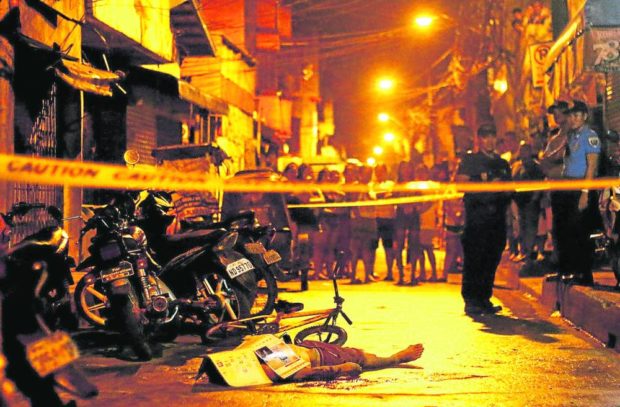Culture of impunity: Two Filipinos killed every day since Jan. 1 – think tank

CONTINUING CULTURE OF IMPUNITY: The Institute for Nationalist Studies has monitored 80 cases of people slain in dubious state operations or by unidentified assailants that were reminiscent of the killing of drug suspects, including one Aldrin de Guzman in Pasig City in this Feb. 1, 2017, file photo. (Photo by RICHARD A. REYES / Philippine Daily Inquirer)
MANILA, Philippines — At least two Filipinos have been killed daily since the start of the year, underscoring the continuing culture of impunity in the country even in the middle of the COVID-19 pandemic, according to an independent monitoring group.
The Institute for Nationalist Studies (INS), a research think tank composed mostly of young academics, has reported that since Jan. 1, there have been 80 cases of people killed in dubious state operations or by unidentified assailants.
The tally is part of INS’ “Pusila” project, which has been keeping track of all extrajudicial killings (EJKs) since last year, whether related to drugs or not, as the Duterte administration enters its final months.
Project leader Karl Patrick Suyat said that 28 of the killings were unsolved cases while 18 were drug-related and 11 others were political/counterinsurgency-related. The highest number of fatalities was logged on Jan. 15 with 8, followed by Jan. 21 with 7.
One striking trend noted by INS was that most of the deaths (10) were concentrated in Negros Occidental, including the case of four abducted men (Arnold Cuadra, Jhundelle and Leonil Rafols, and “Kugan”) whose bodies were found in three different cities on Jan. 7.
Article continues after this advertisementAccording to Suyat, the killings have gone on unabated amid the country’s preparations for the May elections and a surge in COVID-19 cases due to the more contagious Omicron variant.
Article continues after this advertisementLast year, as the country grappled with the pandemic, INS recorded 1,411 cases of EJKs which meant that nearly four people were killed daily.
Brazenness barely changed
Interestingly enough, the number of drug-related deaths tapered out in mid-2021, or shortly after the retirement of former Philippine National Police chief Debold Sinas. “However, it doesn’t mean that it drastically slid down. The number did go down but the kind of brazenness of the killings barely changed even now,” Suyat said.
What did intensify last year was the war on dissent, as 2021 became a deadly year for activists, he added. The most notorious example was the March 7 “Bloody Sunday” incident in which nine activists were killed in a series of raids across the Calabarzon (Cavite, Laguna, Batangas, Rizal, and Quezon) region.
“The biggest trend really is that the culture of impunity has worsened,” Suyat said, adding that “nowhere in any previous government, including Marcos’ administration, have we seen these kinds of killings where every day someone is being killed.”
“Even just talking about 2021, 1,411 deaths [are] very astounding and outrageous,” he said. “How can a society trying to survive a fatal pandemic manage to kill 1,411 of its citizens in different cases of assassinations?”
Like most third-party independent tallies of deaths under the Duterte administration, Pusila’s data is culled from reports in the Inquirer, Rappler, ABS-CBN, GMA, and local news organizations, Suyat explained.
Heart of Pusila
The point of the project is “to continue to record the killings in our midst, whether they are killings or drug-related,” he said. “This is one thing we have failed to do with past killings under two presidents,” he added, referring to the late dictator Ferdinand Marcos and President Rodrigo Duterte.
“That’s the very heart of this project: to give names and faces to these people,” he said. “They’re not just alleged rebels, they’re not just this or that—they were people who lived and ate with their families and who were killed by a government that insists on a take-no-prisoners approach to criminality and rebellion,” he added.
A priest, meanwhile, urged his colleagues to denounce the killings, injustice, and corruption happening today, saying that “there [was] no place for each Christian and Catholic to be neutral.”
According to Fr. Danny Pilario, a theologian and member of the Catholic Theological Society of the Philippines, there is no place for neutrality in the face of injustice and destruction of the common good in society.
Fr. Flavie Villanueva, a missionary from the Society of the Divine Word, echoed Pilario’s sentiments. “We are called to become prophets to proclaim [and] also denounce anything contrary to the good use. And that is to denounce the killings, corruption, and anyone who enables these atrocities,” he said during the recent virtual forum led by 1Sambayan on the role of the Church in the upcoming campaign period for the May elections.
The “separation of church and state,” which serves as a hindrance to the involvement of Christians in political issues, was barking up the wrong tree, Pilario said.
“Catholics and Christians should meddle in politics,” he added, noting how Pope Francis, in a 2016 homily, had said that “a good Catholic meddles in politics, offering the best of himself so that those who govern can govern.”
READ: Int’l rights group show more proof of impunity in serious rights violations in PH